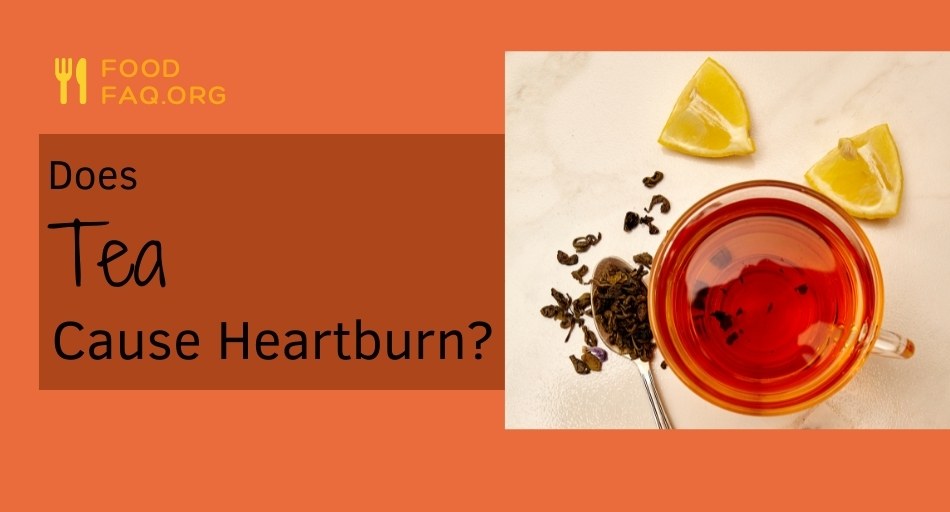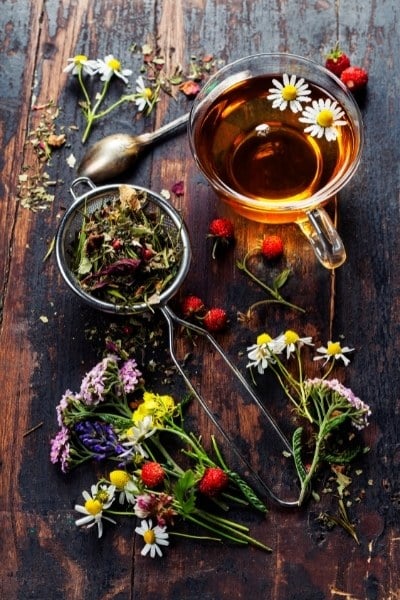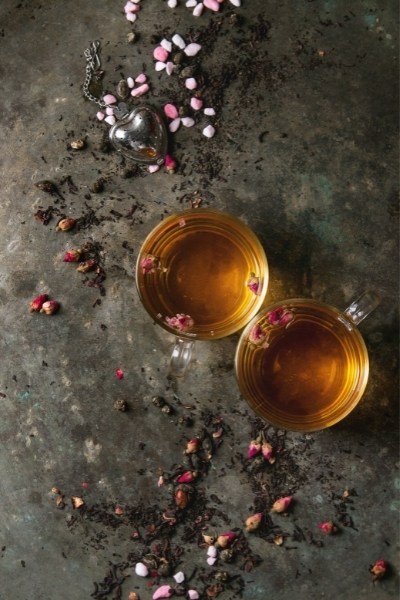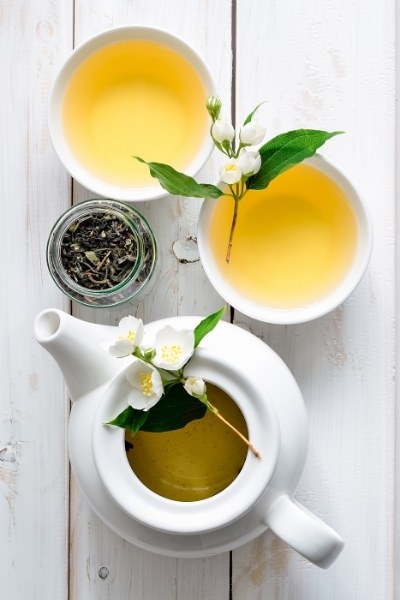If you suffer from acid reflux, you know how important it is to consume foods and beverages that don’t worsen your symptoms. For example, while it’s important to stay hydrated, some drinks tend to be acidic, which may aggravate your acid reflux symptoms, such as heartburn.

One of the most popular drink choices is tea, but some people worry that it might be acidic. So, does tea cause heartburn?
Table of Contents
Does tea cause heartburn?
Tea is mildly acidic, which means it can lead to heartburn and other acid reflux-like symptoms in some people. On the other hand, some people find that having some tea from time to time can help them soothe their esophagus and stomach.
So, always make sure to try new foods and beverages carefully and wait to see how your body reacts.
Is tea acidic?
Most types of tea have a pH level of around 7.2, which means that they’re slightly above neutral. Green tea has the highest pH level, while fruit teas like rosehip or blackberry have the lowest, reaching almost 2 or 3.
Many more factors influence the acidity of your tea, including how long you steep it, what you add to it, and how much you dilute it. So, if you’re looking to make your tea as alkaline as possible, make sure to keep those in mind.
As the least acidic tea, green tea is the best choice for people with acid reflux and those prone to heartburn and other issues.
Green tea is also one that’s the highest in antioxidants and other essential plant compounds that make your beverage even better for relieving heartburn. As a result, choosing green tea is your best option to avoid heartburn.
Is tea good for you?

Tea is a wonderful, healthy beverage that provides you with almost no calories in a single serving. Because of that, it can be an excellent replacement for juices and sodas high in sugar and calories. This is because tea still provides you with flavor and health benefits but without any additional calories.
As a result, adding tea to your diet instead of other calorie-rich beverages can contribute to healthy weight loss and weight management.
Tea, especially green tea, contains a lot of beneficial plant compounds and antioxidants. These help to flush out harmful free radicals from your body, preventing oxidative stress and damage to your cells.
Because of that, drinking tea can lower your risk of various chronic conditions, such as cancer, diabetes, and heart disease.
The types of antioxidants most commonly found in tea are polyphenols, which reduce the risk of cardiovascular issues and improve your general health. So, adding tea to your diet can be an excellent idea.
The best tea to choose is the one that requires steeping leaves. This kind is the highest in antioxidants and other plant compounds as opposed to instant tea.
Tea leaves also provide you with more flavor, making it much easier to drink more of it than sugary sodas and juices. They’re also easily available in most stores so that everyone can enjoy them.

To get the most out of your tea, make sure to avoid adding too many additional ingredients to it, especially sugar. It’s not only bad for your health and rich in calories but can also make your cup of tea much more acidic, triggering heartburn and other issues.
Also, try avoiding bottled teas as they’re loaded with preservatives and harmful preservatives that can aggravate your acid reflux and GERD symptoms even more.
How does tea cause heartburn?

The most common way that tea can lead to heartburn is as a result of the theine it contains. This compound is the same as caffeine but is found in tea.
Theine and caffeine are both associated with an increased risk of heartburn and other acid reflux and GERD-related symptoms.
Caffeine also tends to be irritating for your stomach and esophagus, leading to inflammation and heartburn. To avoid that, you might want to choose caffeine-free teas to prevent this issue.
Tea may relax the lower esophageal sphincter muscles in some people, especially those prone to heartburn. These muscles are meant to keep the contents of your stomach down, preventing them from rising up your esophagus.
Unfortunately, a compound found in tea called theophylline relaxes these muscles, releasing the stomach acid to your esophagus, causing heartburn.
Because of that, drinking too much tea when you suffer from acid reflux might not be a good idea.
Can tea help with heartburn?

Tea is made with hot water, which contributes to good hydration. Staying hydrated improves your health and prevents heartburn by diluting your gastric acid. This makes the stomach contents less likely to rise up to your esophagus, causing heartburn.
Drinking enough water also helps prevent other health issues, keeping you healthy and clear from various conditions and diseases. So, in that way, staying properly hydrated is incredibly important for your health, and tea can help you do that.
What’s more, some studies show that herbal teas can help with acid reflux and GERD symptoms. This is because they’re lower in caffeine, so they’re also less likely to cause heartburn and increase gastric acid production in your stomach.
What’s more, adding milk to your tea can also be helpful, especially if plain tea irritates your stomach and esophagus.
Some experts recommend drinking caffeine-free herbal tea to avoid the side effects of caffeine on your esophagus and stomach.
Herbal teas also contain powerful antioxidants that can help you stay healthy and prevent various health issues, including indigestion and inflammation that contribute to heartburn and other acid reflux symptoms.
So, try going for teas like chamomile, licorice, slippery elm, and marshmallow. These types of tea help coat your esophageal lining, increasing mucus production and soothing your stomach.
Whether tea causes heartburn depends strongly on how you prepare it and how sensitive you are to caffeinated beverages.
Generally, drinking moderate amounts of tea – especially green tea – shouldn’t irritate your digestive system or lead to heartburn.
But make sure to listen to your body and adjust your diet accordingly if you start noticing some unpleasant symptoms.
Don't know what to drink? Check out these articles: 20 Most and Least Acidic Juices and 20+ Alcoholic Drinks Ranked by Acidity Level
